- Home
- Jen Lancaster
I Regret Nothing: A Memoir Page 12
I Regret Nothing: A Memoir Read online
Page 12
In other words?
Chiudi il culo! (STFU.)
Also, this lady wears a bowling hand brace to compensate for her carpal tunnel and that bugs me.
When Fletch asked how I was sure it was a bowling brace, I replied, “Because it says Brunswick on it.”
After our instructor tacitly ignores Brunswick’s weekly cry for attention, we begin to discuss numbers. Our homework was to study numbers one through twenty, so naturally, I learned up to number one hundred. (Again, it’s with deep regret that I wasn’t hip to the pleasures of being the teacher’s pet back in the day.)
So, Donatella says we’re going to count to twenty and asks us to repeat after her. We get to number three before Brunswick throws us completely off course. Here’s the thing—when you’re learning a language, it’s imperative to hear the word BEFORE you can pronounce it, hence the listen-then-repeat command. But like every single other time, we get a couple of words in of listening and repeating before Brunswick loses the pace and begins to say the words with the instructor, ergo, no repeating. Dollars to doughnuts, this woman could throw an entire stadium off by clapping on the wrong beat.
Accidenti! (Damn it!)
When we finally manage to count to twenty, Brunswick makes an important discovery.
“I thought venti meant coffee,” she begins. “At Starbucks, venti means coffee.”
“Actually, it’s a size,” says the nice 11/12/13 woman next to me. “It means twenty ounces.”
(Fine, maybe I don’t know everyone’s names yet, but I figure I have only so much brain capacity, so I’m better off filling it with verb conjugations.)
“But I thought everything was in French, because of the grande,” Hand Brace argues. “Does grande mean sixteen ounces in French?”
“Non,” reply the Moroccan students in unison.
Donatella tries to move us along to the numbers after twenty, but Brunswick is having none of it. “Then why would Starbucks do that? That makes no sense. They should do Italian OR French because it’s confusing. In fact, that’s why I don’t even like their coffee. I’m a Dunkin’ Donuts person. Why would anyone pay four dollars for a cuppa joe when Dunk’s is so much better?”
It now occurs to me that Brunswick spends a lot of class time asking why about questions that have no answer except, “Because that’s how it’s done.” Why do the Italians use the indefinite article? Why are there masculine and feminine words? Why are flowers masculine when very clearly it’s ladies who like them? How come the h is silent? How come our teacher pronounces h like “hache”? Why are some verbs irregular?
What matters is not the why of these rules, but that they exist at all. We need to learn the specifics, not debate them. This is Rudimentary Italian, taking place in the basement of a far-flung suburban insurance office, not a seminar on Advanced Linguistics at Oxford University.
Brunswick continues her diatribe. “What about tall, then? Is that Italian? How come tall is actually small at Starbucks?”
That’s when it hits me that Brunswick is a time burglar.
Specifically, she’s stealing my time with her inane questions and now she is my nemesis. It’s one thing to have legitimate questions—I mean, this is a classroom and we’re here to be taught. We’re all beginners and it’s expected that we’ll make mistakes. Being able to ask questions without feeling like a dipshit is one of the biggest benefits of having become middle-aged. I can think of dozens of instances in my college classes where I didn’t seek clarification because I was too embarrassed to raise my hand. What might have been illuminated had I not been afraid to ask?
Yet what this woman fails to realize is that she’s ignoring the social cues that her questions are not appropriate, as they do nothing to edify any of us. What’s even worse is she’s now thrown the entire class off course and everyone’s busy trying to explain beverage sizes to her in regard to a coffee shop she actively avoids.
Nothing about our conversation matters, so it’s up to me to get us back on track.
I snap, “It’s a marketing term, okay? Can we please move on?”
Donatella shoots me what I swear is a grateful look and we proceed to thirty, which is trenta.
“Hey, trenta is the newest Starbucks size and . . .”
Accidenti!
Donatella wrests control of the class away from Brunswick and we continue with our lessons. Once we complete the numbers section, we begin to discuss geography. She explains how Italy is a very diverse country, and each region has distinct characteristics. Before she can describe any of said characteristics, Brunswick feels compelled to chime in. “Do the north and the south still hate one another?”
Donatella takes a moment to consider the least stupid question Brunswick has ever posed. “Well, the relationship is a little more complicated than that,” she begins. “You see, the south does not have the economic opportunities found in the north, so—”
Brunswick says, “When I was a kid, we lived in Highland Park, a block away from the Highwood border, and Highwood used to be full of Italians.”
The fact that she doesn’t actually say Eye-talian is a pleasant surprise.
She continues. “Why was it full of Italians, I wonder? Anyway, we had northern Italians on one side and southern Italians on the other and they HATED one another. They fought about everything—the hedges, the trees, who was supposed to shovel. We never did understand why they hated each other so much. My dad said he never saw anything like it.”
I glance around the room and notice half a dozen students mid-eye-roll.
Donatella takes a breath, smiles tightly, and continues. “So, Italy is made up of twenty regions.”
I want to cheer her ability to ignore the intrusion, but I’m too interested in what she has to say. Turns out, she’s just finished the itinerary for the annual trip she hosts in the spring—a cooking tour of the Amalfi Coast! The trip is all-inclusive, with luxury accommodations and tons of side trips.
(Sidebar: Apparently Brunswick is a huge fan of gnocchi, but she doesn’t understand why we don’t pronounce the g the same way we do in the USA.)
This tour might be just the thing for me. I’m in this class because I plan to go to Italy, but maybe I’d be better off going with a group and a set itinerary? I fear that on my own, I would eat my own weight in gelato while sitting in my hotel room watching Italian soap operas. (If my history is any indication, my Eat, Pray, Love goal will morph into Eat, Eat, Lounge.) Maybe I need the social interaction of a group tour? Unless Brunswick is going, in which case, I will look at my globe to determine the farthest point away from her I could get.
Classmates begin to ask questions about the tour, as we’re all quite interested. 11/12/13, who’s traveled with our instructor before, wants to know if some of the same guides will be used because they were great last time. The mother of the preemie is curious if she could book her own flight. Instead of Lufthansa, she’d prefer to use her miles on American.
(Sidebar: Did you know you can get a ticket to Rome off-peak for twenty-five thousand miles?! How was I not informed?)
I ask if I could upgrade, not because I’m so goddamned special, but more because I’m fairly claustrophobic and dread wedging my large ass in a tiny seat for eight hours. Also? Snacks!
“Upgrading costs money,” Brunswick informs me.
Really? That’s a news flash. I thought I could just work my way to the good seats on the merits of my charm alone, or perhaps trade some shiny beads. Does Lufthansa accept repainted dressers as payment? I seem to have them in spades.
She continues. “Why would you want to upgrade? It’s not like Business Class is so much better. Why can’t you sit with the rest of the tour? What if your upgrade puts you on a different flight? If I go, I’d definitely sit in Coach.”
Upgrade it is.
Our session ends promptly at seven o’clock every week as Dona
tella has another class directly after this one. We’re all too courteous to linger because our time is up, so we quickly gather up our quaderni (notebooks) and, in my case, empty venti-sized Starbucks cup.
Except, of course, for Brunswick.
“Hey, can you check my homework from two weeks ago?” she asks, wedging in front of where I’m currently donning my coat. She thrusts the sheet toward Donatella’s kind face, because, of course she does.
“You understand I have a class waiting, yes?” Donatella asks.
“It won’t take you long,” Brunswick replies, flopping down in a chair next her.
I exit, making a mental note to look up the Italian word for douche bag.
As annoyed as I am, I still find myself smiling as I climb into my car. How am I concurrently so annoyed and yet still feel so happy?
As I drive home, I realize that the only thing I enjoy more than saying yes, checking items off my list, or learning Italian is having found a new nemesis.
Game on, doccia borsa.
Game on.
12.
THE RECORD SHOWS I TOOK THE BLOWS
Partway through the semester, Brunswick quits the class. Our teacher relays she was too busy to make it on Monday nights. Doubt it. I bet with all the other hypermotivated students, she felt like she’d fallen behind and she couldn’t catch up because it’s impossible to learn something new when you never, ever once shut your word hole and open your ears.
She shan’t be missed.
(Sidebar: I may miss her a little. I kind of loved actively hating her for sixty minutes every Monday. Now I need to find a new nemesis. I may go back to despising our mailman, as he’s taken to leaving our mailbox open, but only when it’s snowing or raining. I am thisclose to renting a PO box so I can up my battle properly with this assclown.)
On our last night of class, we discuss how Italians do Christmas. Apparently it’s not nearly as commercial over there and the celebration is far more about food than presents, with loaves of raisin-studded panettone everywhere. Instead of beef tenderloin or roast turkey, the big holiday meal is all about the Feast of the Seven Fishes. Entire villages come out to rejoice together. They begin their partying on the day of the Immaculate Conception on December eighth, ending with the Epiphany on January sixth, and there are nativity scenes everywhere. I wonder if teenage boys are always stealing the baby Jesus in Italy, too. Or is it no fun because there are so many that it’s all like shooting (seven) fish in a barrel?
Babbo Natale is the Italian version of Santa Claus but there’s a character named La Befana who’s also important. She’s a good witch who rides around on her broom and fills Christmas stockings, usually on January sixth. In La Befana lore, she was mixed up with the Wise Men somehow, but I’m unclear on the hows and whys. I guess she’s as plausible as a space-time continuum–bending rabbit bringing chocolate eggs to kids in multiple time zones at Easter or a rich, nocturnal fairy with a tooth fetish. In practical terms, it sounds like La Befana isn’t a witch so much as she is a savvy shopper who waits till after the holiday to buy marked-down candy. Personally, I always snap up all the Christmas ornaments on December twenty-sixth because they go half off at Target that day. (If you wait until the twenty-seventh, all the best items are gone. I’m serious—set your alarm.)
Donatella brings homemade tiramisu and we lose our minds over how she’s made it both dense and velvety, but also so very airy, the whole concoction infused with the promise of espresso and liqueur. Then, fueled by sugar, Kahlua, and a competitive spirit, we play Tombola, which is basically Italian-style bingo. Instead of daubing our cards like we would in a VFW hall or church basement, we cover the spaces with large dried beans. I love how we use the same deck that Donatella’s been playing with ever since her childhood. She’s definitely connecting us with her personal history in a way I never experienced in a college classroom. Again, this is the difference between voluntarily learning as an adult and taking a required class for a grade in pursuit of a degree. Both have merits, but this way feels more meaningful.
Oh, and, I don’t mean to brag, but I do win seventy-five cents over the course of the game, so . . . coffees are on me tonight.
The merriment of the year’s last class nicely kicks off the whole holiday season and I really want to celebrate. Every year, it’s depressing to go from the full-court holiday press of glitter-spackled, mistletoe-hung, beribboned first floor to what looks like any other day upstairs in the family room, so I purchase a small artificial tree, adorning it with all the extra ornaments from last year’s day-after-Christmas sale.
I figure I must truly be middle-aged now, having previously fought to the death over having a “fake tree.” Yet I quickly adapt to not vacuuming up shed needles every fourteen minutes and not worrying the whole thing will spontaneously combust when I make a spark dragging my slipper-clad feet across the carpet. Plus, manufacturers have come a long way with the design and technology and these trees are so realistic! Gone are the days of green pipe cleaners stuck in a metal pole. I still have a live Frasier fir downstairs (and two fire extinguishers within grabbing distance) but I can imagine a time when I fully convert to artificial. When I do cross over, I suspect I’ll also finally understand the allure of the decorative holiday sweater and earrings made out of jingle bells.
Feeling extra-festive, I decide to start baking early in the season. Thanks to Martha, I’m fully confident in my newfound culinary abilities, and inspired by Joanna’s Twenty-Four Days of Christmas Cookies, I take to my kitchen with a metric shit-ton of supplies, ready to craft cookies for everyone I’ve ever met. (Except my mailman.)
This is the first year I’ve listened to BackSpin while baking—did you know there are actual holiday rap songs outside of Run–D.M.C.’s “Christmas in Hollis,” such as Snoop Dogg’s “Santa Claus Goes Straight to the Ghetto,” or Eazy-E’s “Merry Muthafucking X-Mas”? Believe it. Ensconced in a funky backbeat, I begin to make some elfin magic.
(Sidebar: Was the Keebler reference above too esoteric?)
I’m vaguely disappointed when my first variety of cookies turns out badly, but sometimes that happens. My oven confuses me because there’s a convection feature and I’ve been known to hit the wrong button, usually when wine is involved or if I’m panicked before a dinner party. (Redundant?) But today, I’m having hot chocolate, so I chalk it up to bad luck.
Of course, when my entirely different second batch ends up crumbling and dry to the point of Saharan, I’m aggravated. It’s possible I’m grooving too much to pay attention, but come on—it’s hard to focus when MC Shan’s rapping about Santa trading in his sleigh for a Lamborghini with a spoiler kit. Best visual ever!
I turn down the music and proceed with another recipe. I’m shocked and dismayed when I ruin the stupid spritz cookies. These are supposed to be idiot-proof, but apparently not. And when my fourth bunch, this time sugar cookies assembled from a tried-and-true recipe, look less like “snowmen” and more like “testicular cancer,” I’m livid, especially because there’s no one to blame here except myself.
I’m not sure if I got a bad container of baking powder or if perhaps I’m experiencing some kind of divine retribution because Christmas carols are no place for profanity (regardless of hilarity factor), but absolutely nothing works.
As everything I touch is a disaster, I decide to quit.
Here’s the thing—I still could plow through my supplies, confident that eventually I’d come up with a cookie that’s both attractive and tasty. But after four failures in a row, baking stopped being a treat and started to feel like a chore. I don’t have customers waiting for this product and I have lots of other desserts planned for my annual party. Fletch won’t lack for anything sugary during the holiday season. And every year when I stock the freezer with Fourth of July supplies, I end up tossing bags and bags of leftover holiday peanut butter kiss cookies and Mexican wedding cakes to make room.
What a waste of time, effort, and ingredients.
I don’t need to make cookies.
I don’t want to make cookies at this point.
So I have to ask myself, why continue to press on? Why push blithely forward toward that which is frustrating and fruitless? It’s not like holiday baking was on my bucket list, and even if it was, the whole notion of having a bucket list isn’t about crossing off various items, as much as I do love me some checkmarks.
The point of this project, and really, my overarching goal for the year, is to minimize that which I regret. When I review my teens and twenties, I’m mortified by so much of what I did. My more callous and cavalier actions haunt me. In my thirties, the regrets were less about bad behavior and more about terrible choices, some of which I’m still paying for. (Hello, FICO score.)
But in my forties, my greatest regrets have been less about the content of my character and more about my caloric intake. Otherwise, I’ve actively worked to get my shit together, whether it’s been adding culture to my life, or putting my house in order, or coming to terms with being an adult. I’m proud of my career and I love the people with whom I’ve surrounded myself. I’ve striven to make the right decisions, no matter how difficult, and agonized over cutting ties with those who are toxic. I feel like I’m far better for the effort. So every time I do something counterintuitive to that which keeps regrets at bay, I’m mad at myself.
Generation X turns fifty this year, as we’re defined by a 1964 start date. Although I can’t speak for my whole peer group, I can say for myself that by the time I hit my fifties, I hope to have my life figured out. When I’m fifty, I want my default mode to be doing the right thing, making the right choices, and behaving in a way that never makes me cringe upon further reflection.

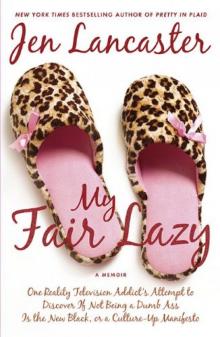 My Fair Lazy: One Reality Television Addict's Attempt to Discover
My Fair Lazy: One Reality Television Addict's Attempt to Discover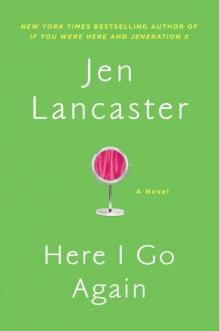 Here I Go Again: A Novel
Here I Go Again: A Novel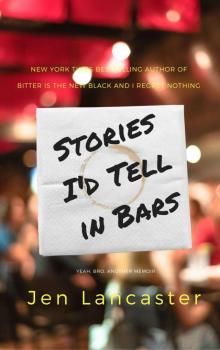 Stories I'd Tell in Bars
Stories I'd Tell in Bars The Best of Enemies
The Best of Enemies Bright Lights, Big Ass
Bright Lights, Big Ass If You Were Here
If You Were Here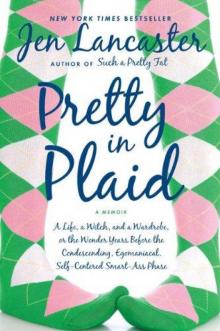 Pretty in Plaid: A Life, A Witch, and a Wardrobe
Pretty in Plaid: A Life, A Witch, and a Wardrobe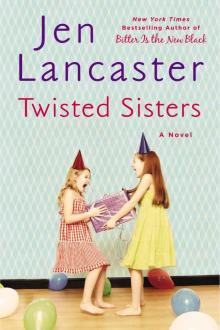 Twisted Sisters
Twisted Sisters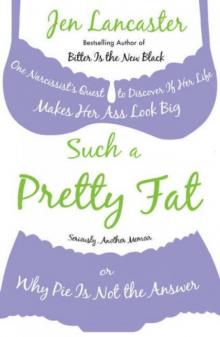 Such a pretty fat: one narcissist's quest to discover if her life makes her ass look big
Such a pretty fat: one narcissist's quest to discover if her life makes her ass look big By the Numbers
By the Numbers Bright Lights, Big Ass: A Self-Indulgent, Surly, Ex-Sorority Girl's Guide to Why it Often Sucks in theCity, or Who are These Idiots and Why Do They All Live Next Door to Me?
Bright Lights, Big Ass: A Self-Indulgent, Surly, Ex-Sorority Girl's Guide to Why it Often Sucks in theCity, or Who are These Idiots and Why Do They All Live Next Door to Me?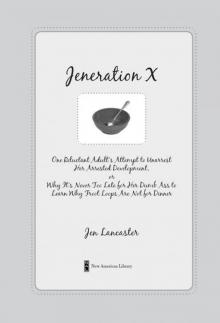 Jeneration X: One Reluctant Adult's Attempt to Unarrest Her Arrested Development
Jeneration X: One Reluctant Adult's Attempt to Unarrest Her Arrested Development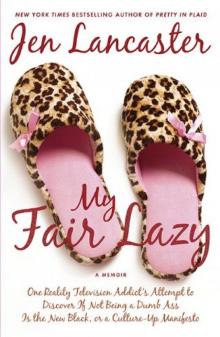 My Fair Lazy: One Reality Television Addict's Attempt to Discover If Not Being A Dumb Ass Is the New Black, or, a Culture-Up Manifesto
My Fair Lazy: One Reality Television Addict's Attempt to Discover If Not Being A Dumb Ass Is the New Black, or, a Culture-Up Manifesto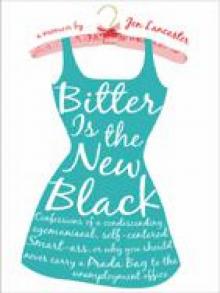 Bitter is the New Black
Bitter is the New Black The Tao of Martha: My Year of LIVING
The Tao of Martha: My Year of LIVING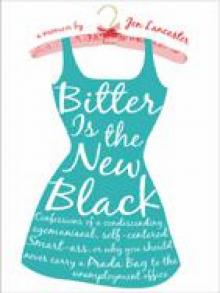 Bitter is the New Black : Confessions of a Condescending, Egomaniacal, Self-Centered Smartass,Or, Why You Should Never Carry A Prada Bag to the Unemployment Office
Bitter is the New Black : Confessions of a Condescending, Egomaniacal, Self-Centered Smartass,Or, Why You Should Never Carry A Prada Bag to the Unemployment Office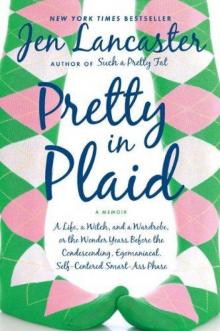 Pretty in Plaid: A Life, A Witch, and a Wardrobe, or, the Wonder Years Before the Condescending,Egomaniacal, Self-Centered Smart-Ass Phase
Pretty in Plaid: A Life, A Witch, and a Wardrobe, or, the Wonder Years Before the Condescending,Egomaniacal, Self-Centered Smart-Ass Phase I Regret Nothing: A Memoir
I Regret Nothing: A Memoir If You Were Here: A Novel
If You Were Here: A Novel The Tao of Martha: My Year of LIVING; Or, Why I'm Never Getting All That Glitter Off of the Dog
The Tao of Martha: My Year of LIVING; Or, Why I'm Never Getting All That Glitter Off of the Dog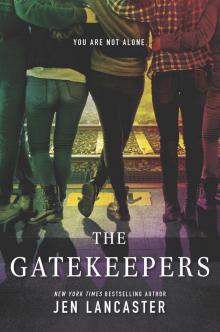 The Gatekeepers
The Gatekeepers